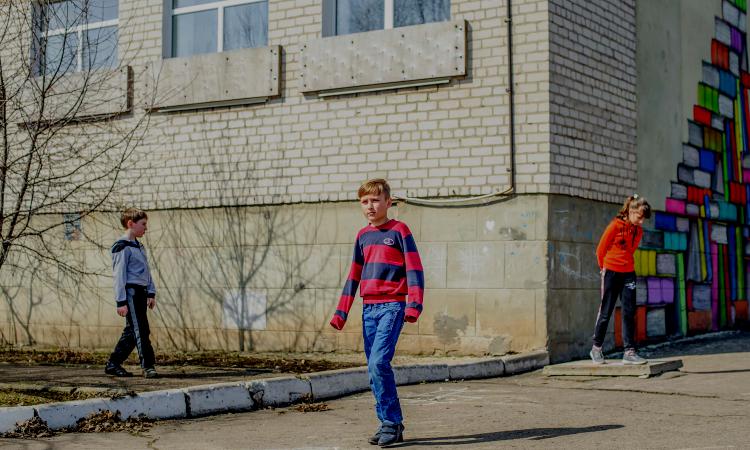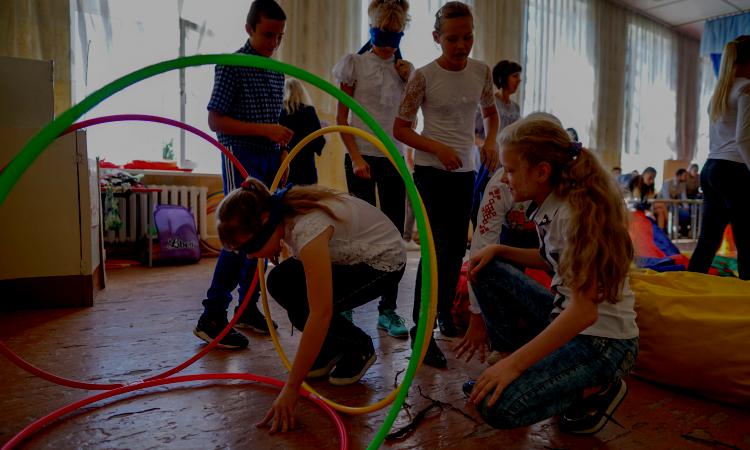Terre des hommes is looking for a proactive, energetic, and organised Social and Behavioral Change (SBC) Officer – Inclusive Education & Disability Inclusion , to join its team in Dnipro city, to support in the implementation of its projects. If you are looking for a meaningful job that will make a lasting impact on the lives of children, we want to meet you.
Position Title: Social and Behavioral Change (SBC) Officer – Inclusive Education & Disability Inclusion.
Duty Station: Dnipropetrovsk / Zaporizhzhia oblasts (with field travel to programme sites, including non-occupied areas of Donetsk oblast as security permits).
Reports to: Project Manager (with functional-technical supervision by Program Coordination)
Duration: till the end of the project.
Purpose of the Role
The SBC Officer will support the design, coordination, and implementation of strategies that promote positive social norms, inclusive attitudes, and community engagement to reduce stigma and discrimination against children with disabilities and special educational needs (SENs).
The Officer will contribute to the Programme “Better Care for Every Child in Community: Inclusive Learning and Protection, Rehabilitation, Mental Health & Psychosocial Support (MHPSS) for and with war-affected children in Eastern Ukraine” and potentially other projects by ensuring that communities, parents, educators, and service providers adopt behaviours and practices that create enabling, inclusive environments for all children.
Important: the SBC Officer is encouraged to deepen his/her understanding of the Theories and strategies of ’Social and Behavioral Change1 ’Positive Deviance in Social norms’ and relevant framework for social and behavioral change.
Key Responsibilities
1. SBC Strategy and Programme Implementation
- Consciously promote disability and inclusion in all aspects of the work.
- Particularly, guided by the approved Programme document, support the development and roll-out of SBC strategies that promote disability inclusion, equal access to education, and stigma reduction against children with disabilities.
- Lead community engagement campaigns, awareness-raising activities, and inclusive communication initiatives in collaboration with local partners, OPDs (organizations of persons with disabilities), and parent groups.
- Together with the Project Manager, support coordinate and seek partnering with the local authorities (Oblast, City and Hromada authorities, including head of Oblast and City, Head of Hromada, Department of Education, Children’s Affairs and other Department for City and Hromada Development and Planning etc.), target schools, and Programme supported Children’s Advisory Boards (CABs) to integrate child participation into SBC actions.
- Support coordinate and seek partnering with local community-based social support services for children, such as, Day Care Center for Children including those with disabilities, Kindergartens, Physical and other rehabilitation centers, foster care families including those who accommodate children with disabilities, parents group for children with disabilities, Organizations for People with Disabilities, Primary Health Care facilities, Resilience center, Inclusive Resource Center, Center for Social Service, local transport services etc.
- Ensure that SBC interventions are gender-responsive, disability-sensitive, and conflict-context appropriate.
2. Community Engagement and Mobilization
- Facilitate the establishment of inclusive parent clubs, peer support groups, and community networks to advocate for inclusive education and child protection.
- Engage children, including those with disabilities, through structured participation methodologies that Tdh developed (CABs, participatory workshops, creative expression activities).
- Support dissemination of Information, Education and Communication (IEC) and Human Interest Tools (HIT) products (videos, Tiktok campaigns, community theatre, visibility materials) in coordination with UNICEF and the Ministry of Education and relevant state administration and stakeholders.
- Work with local influencers, educators, and youth networks to amplify inclusive messages.
- Network with and seek partnering with local community-based social support services to promote disability inclusion and behavioral change for inclusive education, such as, Day Care Center including those for Children with disabilities, Kindergartens, Physical and other rehabilitation centers, foster care families including those who accommodate children with disabilities, parents group for children with disabilities, Organizations for People with Disabilities, Primary Health Care facilities, Resilience Center, Center for Social Service, local transport services etc.
3. Capacity Strengthening
- Provide mentoring for teachers, caregivers, social workers, and community leaders on inclusive communication and stigma reduction.
- Collaborate with partners such as Charitable Organization “Step by Step” and other OPDs to develop inclusive communication materials and adapt global SBC methodologies to the Ukrainian context.
- Strengthen local NGOs’ and community-based organizations’ (CBOs) capacity to design, implement, and monitor SBC initiatives.
4. Monitoring, data collection, Learning, and Assessment
- Support baseline and endline Knowledge, Attitudes, and Practices (KAP) surveys in targeted Hromadas, including facilitation, coordination with stakeholders.
- Support, and in case needed, collect qualitative and quantitative data on community perceptions, attitudes, and behaviour change towards inclusive education and data related to inclusive education.
- Document lessons learned, good practices, and success stories for advocacy and scale-up.
- Contribute to programme reporting and monitoring visits with the support of Tdh MEAL team and ensure SBC results are captured and disseminated at community and national levels.
5. Coordination and Advocacy
- Actively participate in coordination platforms (state coordination platforms such as, Hromada task forces, Oblast Better Care Councils, or UHF supported Education Cluster meetings and Child Protection Area of Responsibility and other relevant clusters).
- Collaborate with the Ministry of Education and Science (MoES), Ministry of Social Policy (MoSP), UNICEF and other relevant ministries and committees and stakeholders to align SBC actions with national inclusive education and protection strategies.
- Advocate for disability inclusion and equity at local Hromada and oblast levels, leveraging evidence generated by the Programme.
Qualifications and Experience
- Advanced university degree in Communications, Social Sciences, Education, Public Health, or related fields.
- At least 3–5 years of experience in SBC, community engagement, Journalism, Media and communication, Advertising & Marketing Communications, Psychology preferably in linkage with education or disability inclusion.
- Fluency in Ukrainian and English.
- Proven experience designing and implementing awareness campaigns, participatory communication eventsor behaviour change initiatives.
- Strong facilitation skills with diverse groups (teachers, parents, children including disabilities, community leaders).
- Familiarity with humanitarian/conflict contexts is desirable.
- Knowledge of disability rights frameworks (UNCRPD, ICF/ICF-CY) and inclusive education approaches is an asset.
Competencies
- Community mobilization: Strong skills in participatory engagement with children, families, and communities.
- Communication & advocacy: Ability to design compelling messages, campaigns, and inclusive materials.
- Cultural sensitivity: Skilled at working across diverse communities affected by war, displacement, and poverty.
- Collaboration: Strong team player with ability to coordinate with local partners, OPDs, and government actors.
- Child-centered approach: Commitment to child rights, disability inclusion, and “Nothing about us without us” principles.
Safeguarding and Child Protection
The SBC Officer will strictly adhere to Tdh Child Safeguarding and PSEA (Prevention of Sexual Exploitation and Abuse) policies. All SBC activities must ensure safe participation of children, including those with disabilities, while fostering protective and inclusive environments.
Application
By sending the application the candidate gives the consent for the personal data processing for recruitment processes solely. Only shortlisted candidates will be contacted for the next stages of the recruitment process. Child Safeguarding Policy: To commit to respect Tdh Risk Management Policies including Child Safeguarding Policy, Safety and Security Policy and Anti-Fraud/Corruption Policy, Whistle Blowing Policy.
GDPR compliance
By sending your application, you agree that your personal data will be used in the recruitment process. All the documents we will request in different steps of the recruitment process will only be used for this purpose. All staff involved in recruitment and selection are aware that data protection rules apply, and that personal information will be treated confidentially. According to our policy, we will keep your application documents for the period of the recruitment only. Due to an anticipated high number of applications, Tdh is not in a position to respond to every applicant individually. Please note that only short-listed candidates will be contacted for the first interview.
TO APPLY: Qualified applicants are encouraged to submit their CV and motivation in English.

